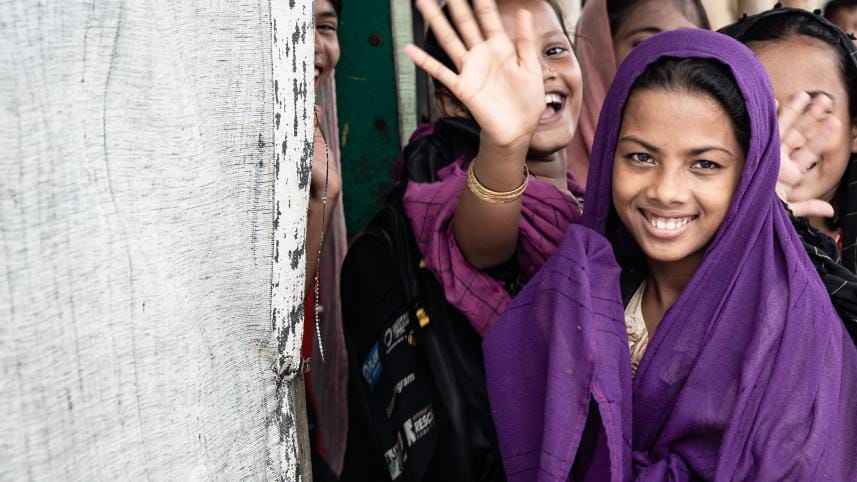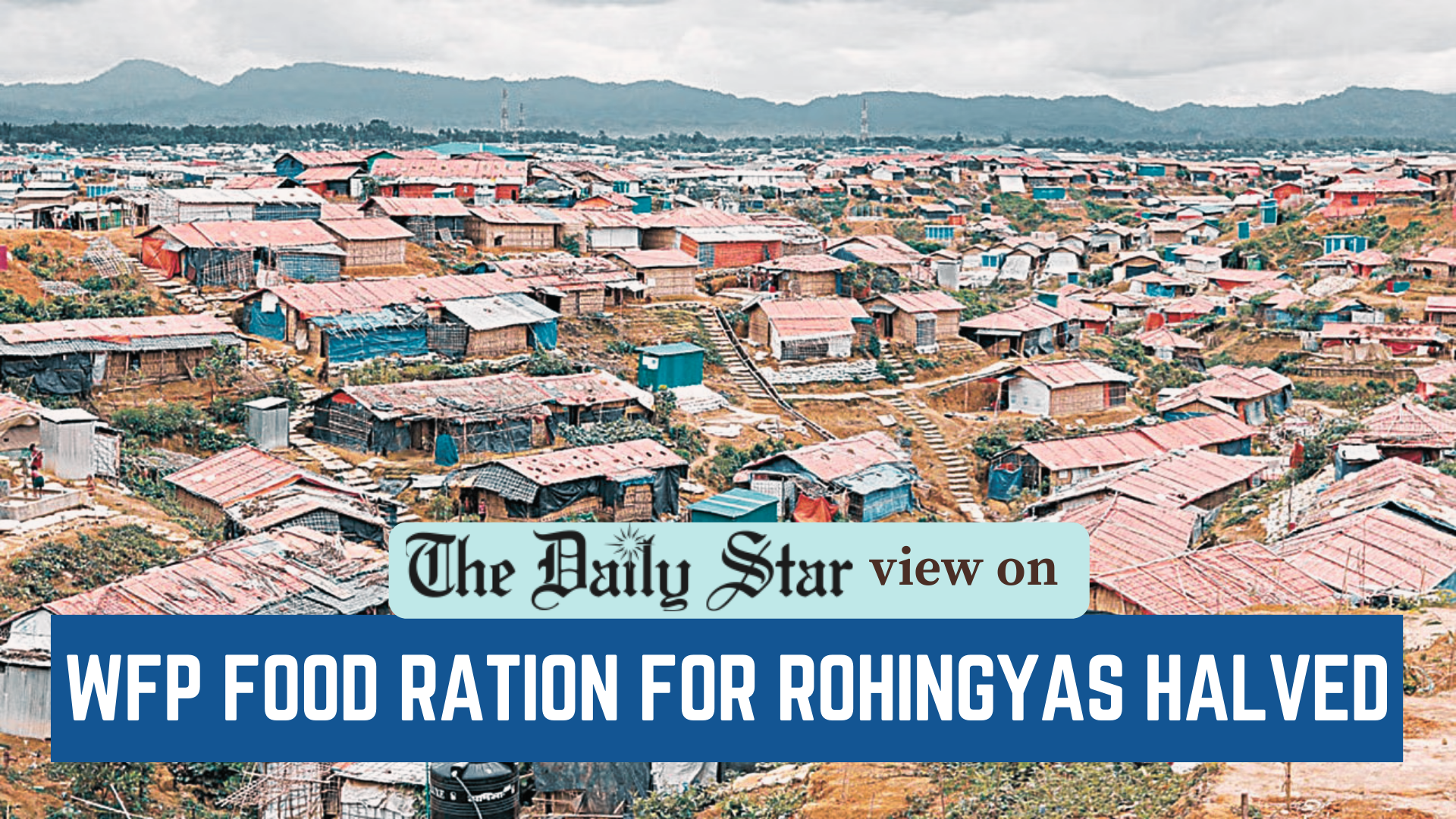We must prioritise education, safety, opportunity for women and girls in Cox’s Bazar

Despite efforts to curb social inequalities, women, and girls worldwide continue to face unprecedented challenges, especially owing to humanitarian crises. And nowhere is this more evident than in the Rohingya camps and surrounding areas of Cox's Bazar. Every visit to these camps and nearby areas—home to locals—reveals the depth of their struggles, with their voices echoing pain, frustration, and desperation for change. During our camp visits, we often come across many women whose words continue to echo in our minds for days. One Rohingya woman once said, "When confronted with violence, I felt lost and unsure of how to respond or how to protect myself in dangerous situations, which are common in camps."
Once an integral part of social spaces, fewer women and adolescent girls meet the eye on the alleys in the camps these days because of inadequate protection, especially from gender-based violence (GBV). As such, their exclusion serves as a stark reminder of the psycho-social barriers they face.
Women—despite making up half the population in the Rohingya camps and neighbourhoods—continue to face economic exclusion, while restricted mobility further traps them in cycles of hardship. With recent funding cuts, support for the refugees is gradually declining while challenges and struggles are amplifying—especially for the women and girls whose futures are now more uncertain than ever.
As we observe International Women's Day this year under the theme "For ALL Women and Girls: Rights. Equality. Empowerment," it is important to focus and prioritise one of the most vulnerable and marginalised groups—the female dwellers of Rohingya camps, as well as the beaches, and hills of the charismatic Cox's Bazar.
Around 614 million women and girls worldwide live in conflict-affected areas. They are often stripped of basic rights like education, healthcare, and economic independence. As such, about 500,000 women and girls representing about 50 percent of the camp population, and another 200,000 females in the host communities in Cox's Bazar continue to combat systematic barriers.
Despite being a basic right, formal education remains a privilege for most Rohingya girls, which stifles their potential and narrows their future prospects, in turn compelling them to opt for early marriage for survival. Furthermore, lack of digital literacy and technical skills only deepens their exclusion from the constantly evolving world.
The situation is no better for women hailing from the host communities in Cox's Bazar, where drop-out rates remain higher than other parts of the country. During one of the visits to areas where locals reside, we met a teen girl invested in taking care of her siblings. She told us, "In our village, girls are expected to marry young because our families struggle financially. I had to leave school to help my mother with household work, even though I wanted to study more."
Such instances compel us to formulate and advocate for sustainable initiatives to improve the overall quality of life of these women and girls, or at least to keep the dream of a just society with well-balanced resources and opportunities alive for the generations to come.
Incomplete education only marks the beginning of struggles for many girls. Widespread child marriage leads to health risks for most young mothers, with reports accounting for around 47 percent of Rohingya women lacking access to antenatal healthcare services during their most recent pregnancy.
The maternal mortality rate being 168 per 100,000 live births at the camps testifies to the urgency of addressing risks. Besides health risks, embracing maternity at such a tender age also restricts their mobility, shrinking their worlds to fit the four walls of their makeshift camp "homes," therefore stripping their decision-making power and chances at financial independence.
Regrettably, the overall healthcare situation of the country is also considerably dire. Overcrowded facilities struggle to provide essential maternal and child health services while mortality rates remain high due to a lack of skilled birth attendants and basic medical care. Meanwhile, malnutrition is also rampant, as women are often the last to eat in households struggling with inflation amid shrinking aid.
Against the backdrop of all the challenges, violence against women and girls in Cox's Bazar remains an urgent crisis. In the Rohingya camps, one in four women report experiencing GBV, with intimate partner violence being the most common. The presence of armed groups makes the situation even more dangerous, increasing the risks of trafficking and exploitation.
On the other end, local women also continue to fight domestic violence, economic dependence, and limited legal protection. Many of them suffer in silence.
Trapped in the economic limbo amid the absence of legal work opportunities, Rohingya women entirely rely on humanitarian aid.
Lack of vocational training or access to financial services further ensures that they remain poverty-stricken, contributing to the barriers to achieving equality through empowerment.
Addressing these challenges requires collective action where all actors must dedicatedly work together to create a safer environment for women and girls, enabling them to contribute and develop their potential. Several initiatives can be taken: establishing accredited education programmes for Rohingya girls while expanding free, quality education for the locals; investing in adult literacy programmes; increasing legal aid and awareness facilities while increasing protection measures for GBV survivors; introducing skills-training, financial literacy programmes and income-generating opportunities for locals; and strengthening maternal and child health services.
Hasina Rahman is country director of International Rescue Committee (IRC) in Bangladesh.
Shabira Nupur is head of advocacy and communication at IRC in Bangladesh.
Views expressed in this article are the author's own.
Follow The Daily Star Opinion on Facebook for the latest opinions, commentaries and analyses by experts and professionals. To contribute your article or letter to The Daily Star Opinion, see our guidelines for submission.





 For all latest news, follow The Daily Star's Google News channel.
For all latest news, follow The Daily Star's Google News channel. 


Comments